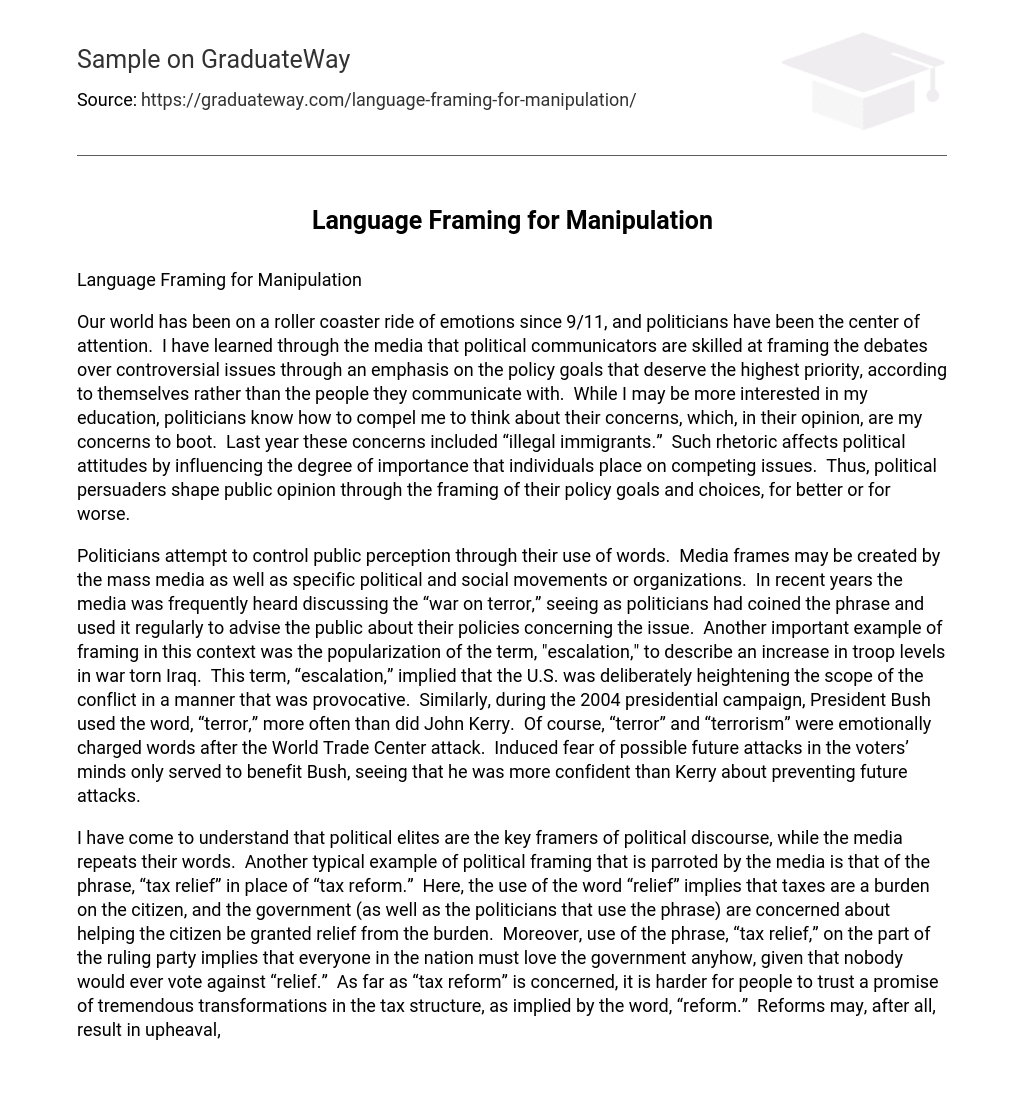Our world has been on a roller coaster ride of emotions since 9/11, and politicians have been the center of attention. I have learned through the media that political communicators are skilled at framing the debates over controversial issues through an emphasis on the policy goals that deserve the highest priority, according to themselves rather than the people they communicate with. While I may be more interested in my education, politicians know how to compel me to think about their concerns, which, in their opinion, are my concerns to boot. Last year these concerns included “illegal immigrants.” Such rhetoric affects political attitudes by influencing the degree of importance that individuals place on competing issues. Thus, political persuaders shape public opinion through the framing of their policy goals and choices, for better or for worse.
Politicians attempt to control public perception through their use of words. Media frames may be created by the mass media as well as specific political and social movements or organizations. In recent years the media was frequently heard discussing the “war on terror,” seeing as politicians had coined the phrase and used it regularly to advise the public about their policies concerning the issue. Another important example of framing in this context was the popularization of the term, “escalation,” to describe an increase in troop levels in war torn Iraq. This term, “escalation,” implied that the U.S. was deliberately heightening the scope of the conflict in a manner that was provocative. Similarly, during the 2004 presidential campaign, President Bush used the word, “terror,” more often than did John Kerry. Of course, “terror” and “terrorism” were emotionally charged words after the World Trade Center attack. Induced fear of possible future attacks in the voters’ minds only served to benefit Bush, seeing that he was more confident than Kerry about preventing future attacks.
I have come to understand that political elites are the key framers of political discourse, while the media repeats their words. Another typical example of political framing that is parroted by the media is that of the phrase, “tax relief” in place of “tax reform.” Here, the use of the word “relief” implies that taxes are a burden on the citizen, and the government (as well as the politicians that use the phrase) are concerned about helping the citizen be granted relief from the burden. Moreover, use of the phrase, “tax relief,” on the part of the ruling party implies that everyone in the nation must love the government anyhow, given that nobody would ever vote against “relief.” As far as “tax reform” is concerned, it is harder for people to trust a promise of tremendous transformations in the tax structure, as implied by the word, “reform.” Reforms may, after all, result in upheaval, seeing as they may be revolutionary.
Returning to the example of “illegal immigrants” – I have observed that the phrase is offensive to immigrant ears. I believe this is because the phrase skews the discourse on the subject, given that it also characterizes honest and hardworking individuals as criminals. By repeating the word “illegal,” political framers were ignoring the contributions of the immigrants to the American lifestyle and the economy. What is more, the phrase, “illegal immigrants,” ignored the systemic causes and problems related to the issue, that is, the cheap labor economy of America driving down the cost of labor, and the various political and economic causes that have contributed to pushing out countless people from their home countries to become “illegal immigrants” in the United States. The word “aliens” is not complimentary either. Whereas the word “illegal” attached to “immigrants” may actually lead immigrants to crime (because everybody thinks they are “illegal” anyway), the word “aliens” may very well lead to an increase in the number or racists.
Language has the power to heal as well as to hurt. Hence, political framing must be such that it leads me to formulate correct opinions and make the right choices as far as voting goes. The power of words I hear through the media is great enough to make me love or hate a certain group of people in the world. While I do not wish to be influenced in my opinions thus – the fact that I listen to media reports about politics of my country and around the world – grants political framing some degree of power over me. I would like, therefore, to hear the right words in the media. Objectivity should work wonders for our world, even if politicians have become used to manipulating minds regardless of the needs of the people.





